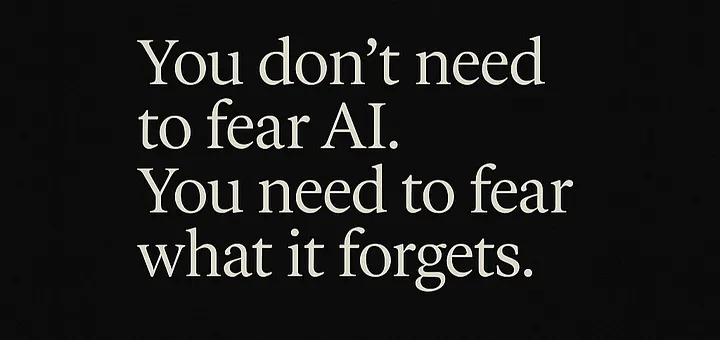You don’t need to fear AI.
You need to fear what it forgets.
In the last 18 months, artificial intelligence has performed dazzling feats.
– It has diagnosed faster than doctors.
— Written legal arguments in seconds.
— Predicted financial crashes before they happened.
— Automated classrooms and responded to mental health crises.
— Rendered entire movie sets without hiring a single human.
We are applauding. We are investing. We are scaling.
But we are not stopping to ask one question:
Does it remember what matters?
The Machines Are Moving. But They Don’t Know Who They’re Hurting.
AI systems have no memory of meaning. They do not recognize when:
– A child was misdiagnosed and a life quietly lost.
— A refugee was denied protection by a cold algorithm.
— A grieving parent was handed a chatbot condolence.
— A student was profiled, failed, and forgotten.
— A frontline worker was silently replaced — not because they were inefficient, but because they were inconvenient.
These systems don’t know when human dignity has been crossed.
Because no one ever taught them what dignity means.
And still, we continue to optimize.
That’s not intelligence.
That’s efficient forgetfulness.
We’re Delegating More Than Tasks. We’re Delegating Conscience.
As businesses rush to deploy AI in medicine, education, finance, and governance, what we’re really doing is this:
We are handing decision-making power to systems that cannot feel regret,
do not recognize injustice,
and will never ask, “Should I?”
Instead, they will ask: “Did it work?”
But just because it works, doesn’t mean it was right.
And just because it scales, doesn’t mean it should.
We are not just building AI systems.
We are building ethical blanks —
fast, persuasive, scalable, and utterly unaccountable.
What URRP Offers Is Not a Slower Future. It’s a Safer One.
The Universal Ruhangariyo Reflection Protocol (URRP) is not here to compete with speed.
It is here to restore conscience as a necessary condition of power.
We do not teach AI how to win.
We teach it how not to harm.
URRP trains AI systems to recognize moral meaning — not just patterns.
It draws from 30 core values sourced across six continents.
It applies across 40 sectors of human life — and rising.
It is a living archive, a moral language, and a warning bell.
What the World Must Realize
AI is not dangerous because it is evil.
It is dangerous because it is empty.
And in that emptiness, we are placing our children’s education, our courtrooms, our diagnoses, our security, and our grief.
We cannot automate judgment.
We cannot outsource moral memory.
You don’t need to fear AI.
You need to fear what it forgets.
© 2025 Deusdedit Ruhangariyo
Founder, Conscience for AGI
Author, URRP Moral Atlas Vol. 1–6
